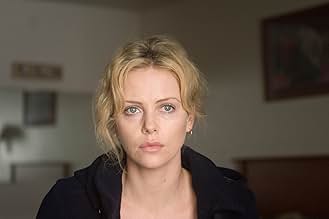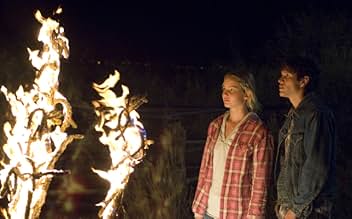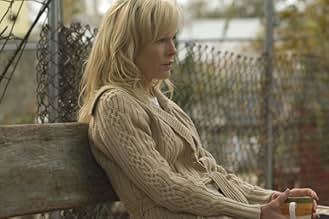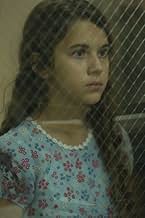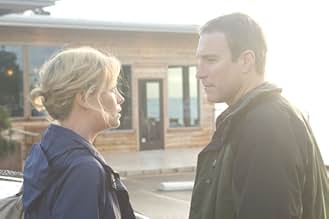IMDb-BEWERTUNG
6,7/10
21.825
IHRE BEWERTUNG
Ein Drama mit einer zweistufigen Handlung über eine Mutter und ihre Tochter, die versuchen, nach der schwierigen Kindheit der jungen Frau eine Bindung aufzubauen.Ein Drama mit einer zweistufigen Handlung über eine Mutter und ihre Tochter, die versuchen, nach der schwierigen Kindheit der jungen Frau eine Bindung aufzubauen.Ein Drama mit einer zweistufigen Handlung über eine Mutter und ihre Tochter, die versuchen, nach der schwierigen Kindheit der jungen Frau eine Bindung aufzubauen.
- Regie
- Drehbuch
- Hauptbesetzung
- Auszeichnungen
- 2 Gewinne & 3 Nominierungen insgesamt
Diego J. Torres
- Cristobal
- (as Diego Torres)
Rosalia De Aragon
- Aunt Rebecca
- (as Rosalia de Aragon)
Empfohlene Bewertungen
Guillermo Arriaga was the writer for Inarritu's films (Amores Perros, 21 Grams, Babel) and directs here for the first time on a major film project. "The Burning Plain" plays out over thirteen years, although all the action is squeezed into two segments at each end of the time span. The film relates how an extra-marital affair has repercussions which echo through the following years. The chain of events is initiated when Gina, a housewife and mother, embarks on a romance with Nick, a Mexican with a family of his own. After a gas tank explosion kills the lovers while they make love in a remote desert trailer, Gina's traumatized teenage daughter Mariana becomes friends with Nick's son Santiago.
Arriaga focuses on the mother, daughter and grand-daughter as the story unfolds. He uses four actresses for their roles - two being required for the teenage Mariana and her 30-something persona - and all of them (Kim Basinger, Charlize Theron, Jennifer Lawrence and Tessa la) give exceptional performances. When Mariana first sees evidence of her mother's infidelity, she remains silent and carries the burden alone. The breach between them widens as she investigations and confirms her suspicions - and the youthful beauty of her face transforms into a mask as she conceals knowledge which could destroy her family. Arriaga portrays her dilemma with a delicacy that amplifies the girl's pain - showing the silent spread of the poison, its contagion first claiming the mother-daughter relationship, and then creating new ripples of damage which will ultimately infect the next generation.
The narrative is tighter than Arriaga's work with Inarritu - it illustrates how one transgression can set in motion the engine of fate. He relies on classic cinematic techniques rather than Inarritu's flashier ones - but as in his previous work, Arriaga breaks up the story's chronological flow by chopping back and forth between two time segments. One can't help wondering if it was necessary here, since the story possesses such a strong arc. However, this is just a quibble - "The Burning Plain" results in something close to a masterpiece which shares themes found in the work of Shakespeare, Thomas Hardy and Dostoevsky.
Arriaga focuses on the mother, daughter and grand-daughter as the story unfolds. He uses four actresses for their roles - two being required for the teenage Mariana and her 30-something persona - and all of them (Kim Basinger, Charlize Theron, Jennifer Lawrence and Tessa la) give exceptional performances. When Mariana first sees evidence of her mother's infidelity, she remains silent and carries the burden alone. The breach between them widens as she investigations and confirms her suspicions - and the youthful beauty of her face transforms into a mask as she conceals knowledge which could destroy her family. Arriaga portrays her dilemma with a delicacy that amplifies the girl's pain - showing the silent spread of the poison, its contagion first claiming the mother-daughter relationship, and then creating new ripples of damage which will ultimately infect the next generation.
The narrative is tighter than Arriaga's work with Inarritu - it illustrates how one transgression can set in motion the engine of fate. He relies on classic cinematic techniques rather than Inarritu's flashier ones - but as in his previous work, Arriaga breaks up the story's chronological flow by chopping back and forth between two time segments. One can't help wondering if it was necessary here, since the story possesses such a strong arc. However, this is just a quibble - "The Burning Plain" results in something close to a masterpiece which shares themes found in the work of Shakespeare, Thomas Hardy and Dostoevsky.
Cause harm repeatedly to most parts of the body and they eventually grow desensitised, calloused and indifferent to the pain over time. This dispassionate, earthy and very dry aesthetic that film-maker Guillermo Arriaga applies to the world of his first major directorial outing is king; between the barren desert landscapes that permeate within the backdrops of his strangely distant and out-of-sync characters and the sparse narrative that intertwines it all together, The Burning Plain views life as a series of scars—cold and unrepresentative of the pain that brought them to the surface, but a firm reminder as such that nothing ever quite goes away, no matter how far you run. For the characters of Arriaga's story, a central catastrophe of sorts serves as the unfortunate catalyst that will bring them all together whether they like it or not. A burning trailer, housing two lovers sharing a passionate affair behind their families back, exploding in a rage of flames seemingly caused by accident. For them, the movie opens with their death thus absolving them from living with their irrevocable actions, but for those they leave behind the past stays as a constant and dictates largely how each of their futures will develop.
Serving as a somewhat humbled character piece that centres on a small group of intertwining stories between the two conflicted families, The Burning Plain is an unassuming and dry landscape of drama. For the majority of the feature, the movie is split between three narratives, most of which take place over different timelines told in a back-and-forth manner which informs but never confuses the viewer as to where each of these characters are going, and where they have been. This multi-layered and contorted style that Arriaga implements here can obviously get a little confusing at times, yet enough care is taken to allow each of the stories to have their own breathing room. As a result, the characters which take centre stage feel nicely developed and human—something integrally important to a story such as Arriaga's. In the end, while it seems that some plot developments never seem to be heading to any sort of meeting point, there exists a sort of catharsis and closure to the movie that ties everything together nicely, but perhaps too nicely. The ending is somewhat dubious, but nevertheless feels like the logical step when taken in retrospect.
As mentioned in the opening paragraph, a central theme to Arriaga's feature here is the suppression of emotion—of a cool, collected and strangely alien approach to relationships with other people. While there are plenty of moments where the director opts to balance such instances out with moments of palpable passion (most of which occur between the two burning lovers), the dominant motif here is that callous and introverted sense of misdirection and ambivalence that plays such a major part in a few of the central characters' stories. The performances then, which can be hard to grasp on to as a result, nevertheless do well to keep things human without ever sacrificing that uniquely cold tone. This isn't a feature that will immediately grasp you with its story or characters, and the performances from the cast are very much the same. Instead The Burning Plain opens up as it goes along, eventually climaxing in a series of finely performed expulsions of emotion. It is in this final act that much of Arriaga's story comes together and pieces fall into place, so it's appropriate that much of the movie's most cathartic, and warmer shades transpire here.
For The Burning Plain to truly come off the screen however, one has to feel for the characters that dominate the screenplay from the get-go, which unfortunately is not the case. While it is certainly evident that Arriaga's crafts an interesting and somewhat unique presentation to an otherwise familiar story thanks to his callous approach to much of the proceeding drama, the movie too often falls a little short of its intended destination thanks to the overly cold opening and unsurprising ending. The result is a feature which definitely succeeds in offering two hours of finely plotted drama, but which also fails at making any more of an impression. The characters are compelling in their own strange way, the narrative complicated but not to the extent that all hope is lost—for those two elements alone I could recommend The Burning Plain to viewers and that's not even taking into account the performances and imagery in twine. In the end however, Arriaga doesn't quite reach where he tries to; The Burning Plain is and enjoyable and rewarding experience, but it lacks the extra zest needed to carry it on through to something more profound and memorable.
Serving as a somewhat humbled character piece that centres on a small group of intertwining stories between the two conflicted families, The Burning Plain is an unassuming and dry landscape of drama. For the majority of the feature, the movie is split between three narratives, most of which take place over different timelines told in a back-and-forth manner which informs but never confuses the viewer as to where each of these characters are going, and where they have been. This multi-layered and contorted style that Arriaga implements here can obviously get a little confusing at times, yet enough care is taken to allow each of the stories to have their own breathing room. As a result, the characters which take centre stage feel nicely developed and human—something integrally important to a story such as Arriaga's. In the end, while it seems that some plot developments never seem to be heading to any sort of meeting point, there exists a sort of catharsis and closure to the movie that ties everything together nicely, but perhaps too nicely. The ending is somewhat dubious, but nevertheless feels like the logical step when taken in retrospect.
As mentioned in the opening paragraph, a central theme to Arriaga's feature here is the suppression of emotion—of a cool, collected and strangely alien approach to relationships with other people. While there are plenty of moments where the director opts to balance such instances out with moments of palpable passion (most of which occur between the two burning lovers), the dominant motif here is that callous and introverted sense of misdirection and ambivalence that plays such a major part in a few of the central characters' stories. The performances then, which can be hard to grasp on to as a result, nevertheless do well to keep things human without ever sacrificing that uniquely cold tone. This isn't a feature that will immediately grasp you with its story or characters, and the performances from the cast are very much the same. Instead The Burning Plain opens up as it goes along, eventually climaxing in a series of finely performed expulsions of emotion. It is in this final act that much of Arriaga's story comes together and pieces fall into place, so it's appropriate that much of the movie's most cathartic, and warmer shades transpire here.
For The Burning Plain to truly come off the screen however, one has to feel for the characters that dominate the screenplay from the get-go, which unfortunately is not the case. While it is certainly evident that Arriaga's crafts an interesting and somewhat unique presentation to an otherwise familiar story thanks to his callous approach to much of the proceeding drama, the movie too often falls a little short of its intended destination thanks to the overly cold opening and unsurprising ending. The result is a feature which definitely succeeds in offering two hours of finely plotted drama, but which also fails at making any more of an impression. The characters are compelling in their own strange way, the narrative complicated but not to the extent that all hope is lost—for those two elements alone I could recommend The Burning Plain to viewers and that's not even taking into account the performances and imagery in twine. In the end however, Arriaga doesn't quite reach where he tries to; The Burning Plain is and enjoyable and rewarding experience, but it lacks the extra zest needed to carry it on through to something more profound and memorable.
- A review by Jamie Robert Ward (http://www.invocus.net)
The writer Guillermo Arriaga, much famed for his trilogy of films with director Alejandro Gonzalez Inarritu, namely Amores Perros, 21 grams and Babel, steps behind the camera and debuts his own directing skills with 'The Burning Plain' a multi-layered affair that at its core tries to explore how we deal with guilt. If you didn't like the style of the afore mentioned films then chances are you wont get on with this either. The story is told in interweaving flashbacks and over different time periods and does require some work on the part of the viewer. But with plot pieces trickled out like a breadcrumb trail right up to the end, a great but subtle score and some breathtaking scenery it grips you as you slowly piece it all together. Added to that there are the two brilliant central performances from Charlize Theron and Kim Basinger, as the damaged mother and daughter and a supporting cast that in their various roles are also superb especially Jennifer Lawrence who rightly won an award at the Venice Film Festival. The cinematography is great and the colours are so warm you can almost feel the Mexican heat coming out of the screen. The direction while not quite as good as Inarritu proves that Arriaga was indeed paying attention and the overall feel is eerily similar. The only downside is that it does leave certain characters stories unfinished but that really is just a minor quibble in what is a very emotionally charged and challenging film.
The pace of the film (probably due to poor editing) is inconsistent. The first half of the film is engrossing, but the second half can be easily predicted. A lot of scenes of the second half can be edited out. Apart from the poor editing, the story itself and the way the story was told are intriguing. The film is women centric and portrays many issues concerning women: breast cancer, housework/chores, mother-daughter relationship, postnatal depression etc.. Charlize Theron suits the leading role particularly after her outstanding performance in the film Monster. But there again exists inconsistency of her appearance in the film (probably due to make-up/lighting filming) - sometimes she appears younger and sometimes older. It's understandable as the director's debut, but I think the director needs to work harder in order to coherently deliver an engaging and technically sound film.
This is a strange movie. If your a fan of the Babel or other work by Guillermo Arriaga, then you will be satisfied with this movie. If your a fan of Charlise Theron then you be satisfied with this movie. If your looking for a gripping drama about how a tragedy affects the lives of different people you will be satisfied. However, if you looking for a good intense drama, this movie will leave you unsatisfied unless you can get over the very disjointed beginning and follow the movie to the end.
I think you have to be familiar with Arriaga's films to really like this movie. He weaves stories together without any thought of a time line and it can make a movie seem very strange. However, if you will follow this movie to the end, it is a good movie. The Acting especially by Theron is outstanding. Give this movie a chance and its enjoyable. Not a masterpiece, but enjoyable.
I think you have to be familiar with Arriaga's films to really like this movie. He weaves stories together without any thought of a time line and it can make a movie seem very strange. However, if you will follow this movie to the end, it is a good movie. The Acting especially by Theron is outstanding. Give this movie a chance and its enjoyable. Not a masterpiece, but enjoyable.
Wusstest du schon
- WissenswertesIn a 2008 interview, Charlize Theron said taking her clothes off in front of cameras in this and any other film is is as easy as drinking for her. "I don't really think about it much. I read the scene and if it makes sense I do it. I treat it the same way as I would any other scene. Whether it's a nude moment or sitting at a bar drinking, it's all choices. I don't think about it as nudity."
- PatzerIn the airborne scene of the crop duster dusting the field, the course and actions of the dusting process were inconsistent with real crop dusting. Spraying began at a point well into the field, and no distinct pattern was set such as to avoid missing or re-spraying spots.
- Alternative VersionenThere are two versions. Runtimes are: "1h 47m (107 min)" for the theatrical release, and "1h 51m (111 min) (Toronto International) (Canada)".
- SoundtracksFalling Star
Written by Ali Dee (as Ali Theodore), Henry Hey, Alana Da Fonseca (as Alana da Fonseca),
Zach Danziger (as Zach Denziger)
Performed by E. Wilson
Courtesy of DeeTown Entertainment
Top-Auswahl
Melde dich zum Bewerten an und greife auf die Watchlist für personalisierte Empfehlungen zu.
- How long is The Burning Plain?Powered by Alexa
Details
Box Office
- Budget
- 20.000.000 $ (geschätzt)
- Bruttoertrag in den USA und Kanada
- 200.730 $
- Eröffnungswochenende in den USA und in Kanada
- 58.749 $
- 20. Sept. 2009
- Weltweiter Bruttoertrag
- 5.642.478 $
- Laufzeit1 Stunde 47 Minuten
- Farbe
- Sound-Mix
- Seitenverhältnis
- 2.35 : 1
Zu dieser Seite beitragen
Bearbeitung vorschlagen oder fehlenden Inhalt hinzufügen

Oberste Lücke
By what name was Auf brennender Erde (2008) officially released in India in Hindi?
Antwort


